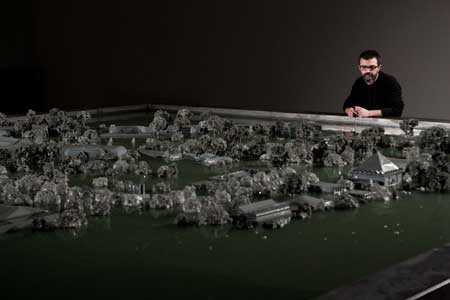 |
||||
|
||||
|
||||
ARTEXT : La Biennale di Venezia
VENEZIA, VENEZIA
Alfredo Jaar's immersive site-specific installation, Venezia, Venezia is an evocative and critical intervention that questions how todays culture, composed of increasingly complex global networks, can be adequately represented at this iconic, international art exhibition. Venezia, Venezia creates an environment of striking visual and somatic encounters. It begins with an obstruction: a suspended 2.5 x 2.5 m lightbox photograph captures the Argentine-born Italian artist Lucio Fontana in 1946 on his return to Milan following the devastation of World War II The intrepid 20 h century artist is poised precariously amidst the catastrophic evidence of his destroyed studio the ruins of a site of creative and critical activity Beyond this unsettling image, stairs lead the viewer over a structure recalling the iconic bridges of Venice to an ominous pool of dark water. From this pool, the complex conditions of art and globalism arise in the form of a perfect replica of the Giardini historically the original site of the Venice Biennale and their first 28 foreign pavilions. Approximately every three minutes, the spectral embodiment of the Biennale breaks through the surface of the water and peers through just long enough to be recognised before it swiftly descends into the dark water and imminent obscurity. The artist has created a future where the Giardini have disappeared. In their brief emergence, they are a ghost from history.. Jaar's installation is a poetic invitation to rethink the Venice Biennale model. The pavilions and their archaic rigidity dissolving into the depths of water reflect the manner in which these pavilions have lost their meaning in the fluidity of today's world culture. Water acts as the tragic agent of sudden deluge, as well as an enduring symbol of renewal: a utopia is created the very instant the Giardini vanish, and the space of the pool becomes a historical opportunity for rebirth. In dialogue with this, the image of Fontana crystalises a key moment in Italian history: one which represents both physical and moral devastation following a catastrophic war, but also symbolising a country hopeful for creative and political renewal. By placing the Giardini's disappearance in the continuation of history, Venezia, Venezia reveals a city still haunted by ghosts that include not only past wars and leaders but also defunct architecture. Similarly to reconstruction that follows war, the creation of a new order, for the Biennale and for Italy, should perhaps follow the flood
Curatori : Madeleine Grynsztejn
Web site: http://www.alfredojaar.net/venezia2013-press/ |
||||
Artext © 2013 |
